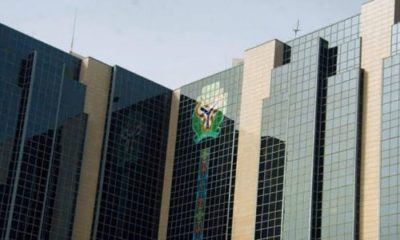Oil
FG Faces Growing Deficit Due To Oil Revenue Drop – CBN Report
In February 2023, the Federal Government experienced a significant increase of 22.8 percent in deficit spending compared to previous months which can be attributed to a substantial decline in oil revenue during that period.
According to the recently released Monthly Economic Report (MER) for February 2023 by the Central Bank of Nigeria (CBN), the deficit for the month amounted to N513.05 billion, bringing the total deficit for the first two months of 2023 to N931 billion.
The report highlights a significant decline in the oil sector, which experienced a 60 percent plunge from N774.15 billion in January to N308.07 billion in February.
Similarly, non-oil revenue also witnessed a 3.7 percent decline to N730.2 billion during the same period. As a consequence of these factors, the revenue accrued to the Federation Account in February experienced a substantial decline of 32.3 percent.
In addition, the Central Bank of Nigeria (CBN) reported that the expenditure side of fiscal operations further exacerbated the deficit position. Expenditure during the period experienced a 5.9 percent increase, amounting to N991.6 billion.
The CBN stated: “At N1.038 trillion, federation receipts were below the level in January by 32.3 per cent. Similarly, it was below the budget of N1.580 trillion by 34.3 per cent.
“The decline relative to January was attributed to a fall in collections from Petroleum Profit Tax and Royalties. Oil revenue, at N308.07 billion, was 60.2 per cent below receipts in the preceding month.
“The outcome was driven, largely, by the 60.5 per cent decrease in collections from Petroleum Profit Tax and Royalties. Similarly, at N730.21 billion, non-oil revenue, was below the level in the preceding month and the monthly target by 3.7 per cent and 7.4 per cent, respectively.
“The decrease was largely attributed to the 10.5 per cent decline in collections from corporate tax on account of the seasonality associated with its payments.
“At N478.57 billion, retained revenue of FGN was below the level in January and the proportionate budget by 7.7 per cent and 42.4 per cent, respectively.
“Provisional aggregate expenditure increased on account of the rise in both recurrent and capital expenditures. Consequently, the provisional aggregate expenditure of FGN at N991.62 billion rose by 5.9 per cent relative to the level in January and was 31.3 per cent below the monthly target.
“A breakdown of the expenditure reveals that recurrent expenditure, capital expenditure, and transfers accounted for 84.7 per cent, 9.5 per cent and 5.8 per cent of total expenditure, respectively.
“At N513.05 billion, the provisional fiscal deficit of the FGN rose by 22.8 per cent relative to the preceding month. “However, it was 16.2 per cent below the budget benchmark.”
Commenting, David Adonri, Vice Chairman, Highcap Srcurities, said: “Full year 2023 appropriation law is a deficit budget. Current administration must obey the law. They can review the budget and send a bill to amend the law.
“However, CBN report covers the period before assumption of office by this new administration. With the removal of fuel subsidy which constitutes a major expenditure item, this administration can cut the deficit if it follows the budget.”
Also, Prof Uche Uwaleke, President, Association of Capital Market Academics of Nigeria, said: “Deficit spending is made worse by rising fuel subsidies and huge debt service burden. This is the major justification for an end to fuel subsidy removal and a halt to contracting new loans that are not self-liquidating.
“This budget cannot attain fiscal consolidation until the challenges posed by fuel subsidy and high debt service obligations are dealt with.”
Commenting also , the Managing Director/CEO, APT Securities & Funds Limited, Mallam Garba Kurfi, said: “It is not a surprise to have deficit as the production of crude oil fall below one million barrel per day.
“The Government should, with immediate effect address the official bunkering of crude oil because from 1.5 million barrel per day, MBPD, reduced to less than one million is a matter that requires urgent attention and need to be given serious attention. This will give immediate relief while looking into other leakages of revenue for blocking.”
Head of Research and Investment at Fidelity Securities Limited, Victor Chiazor, said: “Deficit financing is not really an issue, especially when this financing goes into the production and manufacturing arm of your economy as against deficit financing of consumption.
“We are of the opinion that the deficit position reported by the CBN will significantly drop on the back of the recent subsidy removal by the current administration. The next phase will be to now block other leakages and find smart ways to improve government revenues.
“However, growing government revenues will not be immediate hence we expect this deficit spending to continue in the medium to short term.”
The Managing Director, Sofunix Investment and Communications Limited, Sola Oni, said: “The new administration should reduce the huge cost of governance, channel the anticipated gains from fuel subsidy to provide infrastructure and other indices of enabling environment to enhance productivity.
“Debt reschedule is not new to Nigeria and a lot can be realized from taxation by deploying technology. In 1994, Sweden was nearly bankrupt but by applying spending cut and creative tax generation , the country returned to balanced budget.”
Oil
NNPC Discovers Over 4,800 Illegal Pipeline Connections

The Nigerian National Petroleum Company (NNPC) Limited has revealed the detection of more than 4,800 unauthorized connections on oil pipelines within the country, painting a troubling image of the nation’s primary source of revenue.
Mele Kyari, the Group Chief Executive Officer of NNPC Ltd, communicated this information to the Senate Committee on Appropriations last Friday.
He said, “We have over 4,800 illegal connections on our pipelines. That means in some lines, within 100 kilometres of pipelines, you have as much as 300 insertions.
“Therefore, even when you produce the oil, you cannot deliver them at the required pressure and therefore the volume will also be less.”
As per the NNPC Ltd chief, individuals from various regions enter the Niger Delta, inserting unauthorized connections on pipelines in Nigeria’s oil-producing area.
This recent revelation follows a prior discovery of 295 illegal connections to the pipelines by the firm a year ago, underscoring the escalating issue of crude oil theft in Nigeria.
Two years earlier, Kyari had highlighted the country’s daily loss of 200,000 barrels of oil, amounting to $13 million due to theft and vandalism.
He further stated “We have two sets of losses, one coming from our products and the other coming from crude oil. In terms of crude losses, it is still going on. On the average, we are losing 200,000 barrels of crude every day.”
After the discovery, Nigeria’s security forces pledged to enhance security around the country’s pipelines.
To bolster this, the Federal Government granted a multi-billion naira pipelines surveillance contract to Tantita Security Services, headed by former militant leader Government Ekpemepulo, also known as Tompolo.
Despite facing criticism for this decision, Senator Heineken Lokpobiri, the Minister of State for Petroleum, remains convinced that it was the appropriate course of action.
In August, following a tour of oil facilities in the Niger Delta, Senator Heineken Lokpobiri expressed gratitude to Tantita, commissioned by NNPC Ltd, for their ongoing work.
He also hinted at plans for further extensive endeavors in the future.
In 2021, after extensive debate and delays, the Petroleum Industry Bill was finally passed to attract increased foreign investment into the oil sector through amendments to regulations, royalties, and taxes.
Oil
Dangote Refinery Set To Begin Fuel Production With First Crude Arrival

Nigeria’s colossal $19 billion Dangote Refinery, after encountering several setbacks, is on the verge of kickstarting fuel production.
This achievement is heralded by the arrival of the first crude shipment, transported by the OTIS tanker carrying 950,000 barrels of Nigeria’s Agbami crude.
S&P Global, citing industry sources and tanker tracking data on spglobal.com, reported the tanker’s departure on December 6, en route to Lekki, the nearest land port to Dangote’s offshore crude receiving terminal.
Scheduled to reach its destination around 8 PM on December 7, the arrival of this shipment signifies the commencement of crude supplies for the refinery’s operations.
Chartered by the state-owned Nigerian National Petroleum Company (NNPC), the Suezmax tanker is an emblem of the initial crude supply to Dangote’s cutting-edge refinery, as disclosed by a West African oil trader familiar with the matter in the S&P report.
Even though the refinery was officially completed in May, the absence of domestic crude feedstock had hindered oil product manufacturing.
To address this, the NNPC, holding a 20% stake in the refinery, struck an agreement to provide 6 million barrels of crude oil as feedstock to the Dangote refinery in December.
This move aims to jumpstart operations and overcome the previous impediments.
Agbami, operated by Chevron, holds a prominent position among Nigeria’s major deepwater developments, producing around 100,000 barrels per day in the central Niger Delta.
Known for its light sweet crude qualities, with a specific gravity of 47.9 API and a low sulfur content of 0.04%, Agbami produces substantial amounts of naphtha and kerosene.
NNPC has chartered additional shipments from different Nigerian offshore fields to the refinery, marking the start of a sequence of planned crude supplies for the month, as mentioned by the oil trader.
Located on the outskirts of Lagos, Nigeria’s commercial hub, the Dangote Refinery encountered repeated delays since its 2013 announcement, despite significant installation progress in 2019.
The refinery, designed to handle multiple crudes simultaneously, targets three Nigerian crude grades—Escravos, Bonny Light, and Forcados. When operating at full capacity, it aims to produce 327,000 barrels per day (b/d) of gasoline, 244,000 b/d of gasoil/diesel, 56,000 b/d of jet fuel/kerosene, and 290,000 metric tons per year of propane/LPG.
Dangote’s operations starting signify Nigeria’s hopes to lessen its reliance on gasoline imports, addressing the deficiencies of its existing refineries undergoing repairs. This shift is poised to reshape Nigeria’s oil industry, potentially leading to gasoline self-sufficiency by the 2040s.
Dangote officials anticipate an initial output of 370,000 barrels per day (b/d), emphasizing jet fuel and diesel production.
Industry analysts, however, project the refinery to reach its full operational capacity by mid-2025, although potential delays remain a looming concern.
Oil
NNPCL Sets Dec 2024 Terminal Date For Fuel Importation

The Nigerian National Petroleum Company Limited (NNPCL) has announced intentions to cease importing refined petroleum products by December 2024, anticipating full operational functionality for all national refineries by that time.
Group CEO, NNPC Ltd, Mele Kyari, shared this at a meeting with Speaker Tajudeen Abbas of the House of Representatives, who advocated for the privatisation of Nigeria’s refineries on Thursday.
Projections indicated the national oil firm’s revenue could climb to N4.5 trillion by the conclusion of 2023. Moreover, the rehabilitation of the Port Harcourt Refining Company, managed by NNPCL, was slated for completion by December of the current year.
Meanwhile, Oil marketers verified on Thursday that the Port Harcourt refinery is set for operations, potentially starting in January 2024. They emphasized that once operational, this refinery could notably reduce the prices of refined petroleum products.
During the meeting in Abuja, Kyari asserted Nigeria’s intention to cease importing refined petroleum products by 2024, envisioning the country’s emergence as a net exporter of these commodities within the same year.
He outlined the plans for launching operations at the Port Harcourt, Warri, and Kaduna refineries.
Kyari reiterated that all refineries would operate at full capacity, ultimately paving the way for Nigeria to transition into a net exporter of petroleum products by the conclusion of 2024.
He attributed the inactivity of Nigeria’s refineries over the years to the petroleum subsidy, emphasizing that the removal of this subsidy was drawing significant private-sector investments into the sector.
Kyari said “I can confirm to you that by the end of December this year, we will start the Port Harcourt refinery; early in the first quarter of 2024, we will start the Warri refinery and by the end of 2024, Kaduna refinery will come into operation.
“This is the commitment we are giving today and you can hold us accountable for this. In 2024, many of the initiatives including the rehabilitation of our refineries and also the efforts of small-scale refineries, and the upcoming Dangote refinery, will make Nigeria a net exporter of petroleum products in 2024.
“We will no longer be talking about fuel importation by the end of 2024. I am very optimistic that this will crystallise.
Kyari promised that by the conclusion of 2023, the government’s anticipated revenue from the company would reach N4.5 trillion, emphasizing NNPCL’s adherence to the Petroleum Industry Act and its commitment to delivering value to shareholders.
Recall that in October 2023, it was reported that Nigeria’s monthly spending on the importation of Premium Motor Spirit, known as petrol, had reached approximately N843 billion due to NNPCL’s cessation of oil swaps.
In July of this year, the Nigerian Midstream and Downstream Petroleum Regulatory Authority reported that during the post-deregulation period, spanning June 1 to June 28, 2023, the country’s total petrol consumption amounted to 1.36 billion litres, with an average daily consumption of 48.43 million litres.
The average ex-depot price of petrol, sourced solely from NNPCL as the importer, stands at about N580 per litre.
However, both NNPCL and oil marketers declared on Thursday that this substantial oil import expenditure would soon diminish.
They anticipated a drop once the Port Harcourt refinery commences production of refined petroleum products from January 2024, barring any unforeseen circumstances.




















